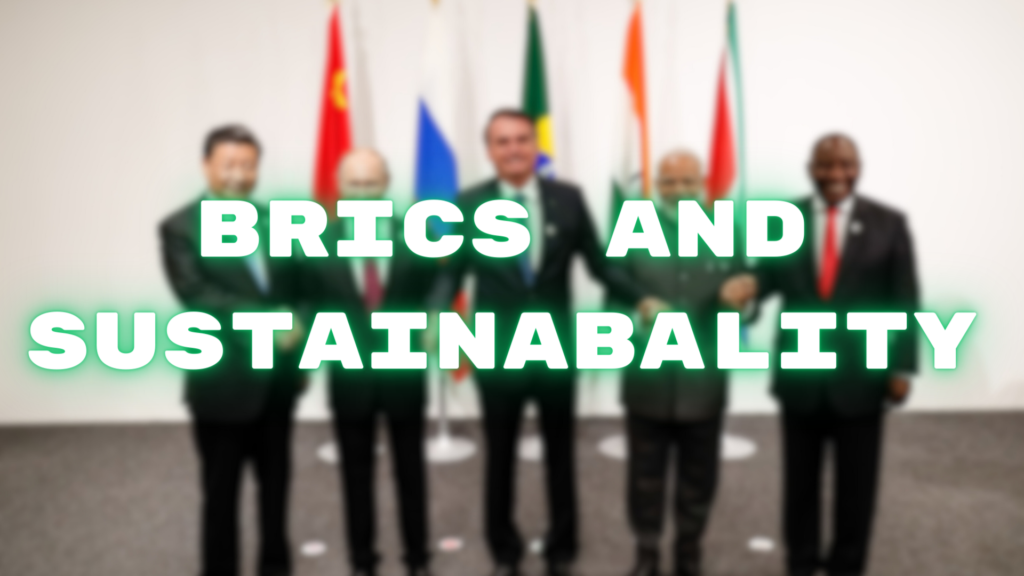
Introduction
Sustainability has emerged as a universal requirement in the ever changing world of today. Nations all across the world are realizing how vital it is to tackle environmental issues and make the transition to a greener future. The BRICS countries—Brazil, Russia, India, China, and South Africa—have distinguished themselves among these countries by supporting sustainability and promoting environmental consciousness. The collective actions of BRICS countries are shaping a sustainable path, leading to a greener future for generations to come. In this blog post, we’ll examine how the BRICS are paving the way for a more environmentally friendly greener future and a sustainable future for future generations.
Understanding BRICS:
What is BRICS?
Let’s first examine what the BRICS group stands for before delving into their sustainability initiatives. The abbreviation BRICS stands for Brazil, Russia, India, China, and South Africa as a whole. These nations, who stand out for their sizable populations, vast lands, and economic might, have teamed up to encourage collaboration, economic growth, and sustainability.

The Significance of BRICS:
On the international stage, BRICS are of utmost importance. These countries make up a sizable amount of the world’s population, landmass, and economic production together. BRICS is a key participant in influencing global policies, notably those pertaining to sustainability and environmental preservation, due to its combined power and influence.
Shared Commitment to Sustainability:
The shared dedication to sustainability is one of the characteristics of the BRICS. Every member state understands how crucial it is to strike a balance between environmental protection and economic growth. Their policies, initiatives, and joint actions to create a sustainable future demonstrate this dedication.
Initiatives and Projects:
The BRICS nations have started a number of programs and projects with the goal of promoting sustainability. These countries are aggressively tackling climate change mitigation, biodiversity conservation, and the promotion of eco-friendly technologies, from investments in renewable energy to sustainable agricultural methods.
Sustainable Urbanization:
The BRICS nations are realizing the necessity for sustainable urban development as urbanization keeps accelerating. They are putting into practice cutting-edge solutions, like eco-friendly infrastructure, effective transport systems, and smart city projects, to meet the environmental issues brought on by fast urban growth.
Challenges and Opportunities:
Addressing Economic Disparities:
The BRICS nations must strike a balance between economic expansion and social and environmental concerns. They must discover solutions to alleviate poverty while reducing their ecological imprint because they are emerging economies. Innovative strategies that put an emphasis on inclusive and sustainable development are necessary for this.
Transitioning to Clean Energy:
Although the BRICS nations have made tremendous strides in adopting renewable energy, the switch to clean energy sources is still difficult. To fulfill the rising energy demands responsibly, this problem requires significant investments in renewable infrastructure, legislative changes, and technical developments.
Collaboration and Knowledge Exchange:
In the area of sustainability, BRICS offers a singular potential for cooperation and information exchange. Member nations can learn from each other’s accomplishments and problems, accelerating progress towards a greener future, by exchanging best practices, research findings, and experiences.
Future Outlook

Harnessing the Collective Potential:
The BRICS nations have a huge potential to lead global sustainability initiatives. Their combined clout, assets, and know-how can open the door for revolutionary change. The BRICS countries may become world leaders in implementing sustainable practices and provide a model for other countries to follow by leveraging their combined capabilities and aligning their sustainability aims. The BRICS countries’ collective efforts may result in the creation of ground-breaking environmental technologies, regulations, and solutions.
Green Investments and Financing:
Their dedication to green financing and investments is a key component of the BRICS’ involvement in sustainability. These nations are devoting significant resources to environmentally friendly infrastructure construction, renewable energy installations, and climate adaptation strategies. The BRICS nations can expedite sustainable development and spearhead the shift to a low-carbon economy by making the most of their financial resources.
Strengthening International Cooperation:
The BRICS nations understand that there is no one way to address the problems of global sustainability. They emphasize the value of global collaboration and alliances in achieving shared objectives. The BRICS countries may encourage information sharing, technology transfer, and policy harmonization to successfully solve global sustainability concerns by working with other governments, international organizations, and stakeholders.
Conclusion:
The BRICS nations have prioritized sustainability at the top of their priority lists. These countries are paving the way for a greener future for themselves and the rest of the globe through their common commitment and combined efforts. The BRICS are presenting themselves as a worldwide force for good change by concentrating on sustainable development, renewable energy, sustainable urbanization, and cooperation.
It is critical to keep up the momentum, support innovation, and fortify global cooperation as BRICS navigates the opportunities and difficulties related to sustainability. The BRICS nations can encourage others to follow their lead and contribute to a healthy and resilient world for both the present and future generations by fostering a greener future together.
Let’s recognize and honor the BRICS nations’ commitment to and efforts towards sustainability. Together, we can create a world where economic progress goes hand in hand with environmental protection, leading to a brighter and more sustainable future for all.








